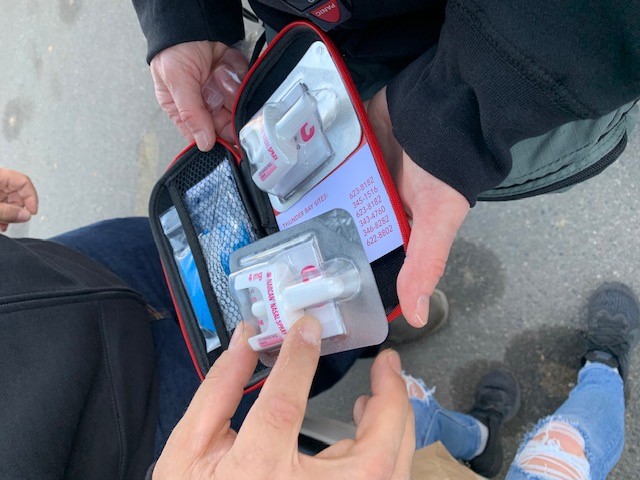Research in Action: Peer program offers helping hand to at-risk population

left: Dr. Deborah Scharf, assistant professor at Lakehead University, is a clinical and health psychologist, right: PhD student Amanda Ruck
Published by The Chronicle Journal on Wednesday, December 2nd, 2020
By Julio Heleno Gomes
A program that lends a helping hand to people who are living with addictions and are at risk for contracting serious diseases is getting a boost from researchers at Lakehead University.
NorWest Community Health Centres has developed a project to have people with “lived experience” provide support and guidance for those using injection and inhalation drug equipment. This peer mentorship program was launched in April 2019 and the participation of Lakehead faculty and a graduate student has already borne fruit.
“It’s easy to make assumptions that the program is working and that there’s value added. But we wanted to make sure these are not assumptions,” says Juanita Lawson, Chief Executive Officer of NorWest CHCs. “It helps to solidify that this is a program we want to continue, we want to adopt and we want to foster.”
NorWest CHCs focus on primary health care, prevention and health promotion in the city of Thunder Bay as well as Armstrong and Longlac. With $281,000 in funding from the Public Health Agency of Canada, they started a program to have peers provide education and support to people who may be at risk for sharing drug-use equipment, in hopes of reducing risk-taking behaviour. HIV and hepatitis C can be spread through the sharing of needles and pipes.
Dr. Deborah Scharf, who has worked with NorWest CHCs, was asked to help shape and evaluate the program. Along with PhD student Amanda Ruck she met with NorWest CHCs staff to develop a framework for research.
“We benefit at the university when we partner with community groups,” says Scharf, a clinical and health psychologist, and assistant professor of Psychology at Lakehead. “It offers students real-life learning experiences and the opportunity to give back to the community we live in. This is an ideal project for us because not only are the staff of the program benefitting, but we are also as partners in research. It’s a pleasure to be able to support the organizations that do good in our community.”
Ruck, who holds a Master’s degree in Public Health with Specialization in Nursing, started on the project as a research co-ordinator and has since made it a component of her PhD studies.
“I got involved to gain more experience and it’s a topic of interest to me,” she says.
Scharf says Ruck has been “absolutely critical” to the success of the project. She also acknowledges the work of Michelle Kolobutrin, project co-ordinator at NorWest CHCs, and Lakehead researchers Dr. Rebecca Schiff and Dr. Anna Koné.
Ruck conducted a review of the literature to show what’s being done in terms of using peers in substance use harm reduction initiatives and how their experiences help to form what they’re doing.
“The focus when you’re doing harm reduction is preventing harm associated with the substance use rather than preventing the use itself,” Ruck explains.
“The peers are the champions of the program. They work with the outreach worker to help engage the hard-to-reach population.”
The participants — who are variously referred to as peer specialists, peer advocates or peer navigators — possess “lived experience.” That doesn’t necessarily mean they’re former users. They can also be close family members or friends.
“It’s not necessarily that the person has a history of injection drug use,” Scharf says. “They’re very well-connected to that community and can speak to the wants, the needs, the likes and dislikes. They sort of speak the same language, so they can help make a program that’s both useful and attractive to the community.”
Along with the review of the literature, Ruck also tracked key data, such as how many presentations were made by the peers and outreach workers, as well as the distribution of needles and naloxone kits (which can temporarily reverse an opioid overdose). She also interviewed staff and peers to determine roles and identify barriers to the program.
A key research component of the project is Photo Voice, where participants showcase their experiences through photos and interviews.
“It’s a photo representation of the volunteer peers’ experience in the program, to help give them a voice,” Ruck says.
One of the insights from the literature review is how programs look in other places and how they should look in the North — which presents a whole set of challenges.
“We have a smaller community, different resources, different geography,” Scharf notes. “So how can we take the nuts and bolts of what we know about a good peer harm reduction program elsewhere and apply them effectively and in a culturally responsible way, in a way that fits with the community here to make it the best we can?”
The project is funded to March 2021 and involves three staff positions and three peers. Along with outreach and engagement to people who share drug-use equipment, the program also offers peers an opportunity to become more engaged with NorWest CHCs.
“We see value in bringing people into the organization who help us move forward and do some learning around what is harm reduction and really focusing on the social determinants of health,” Lawson says. “So they keep us honest, keep us real in terms of living to and abiding by our vision mission and the values of the organization.”
-- 30 --

Photo credit NorWest Community Health Centres: NorWest Community Health Centres’ harm reduction team consists of Josh Fraser, Keeshaw Bauer and Laurie Clarke.


